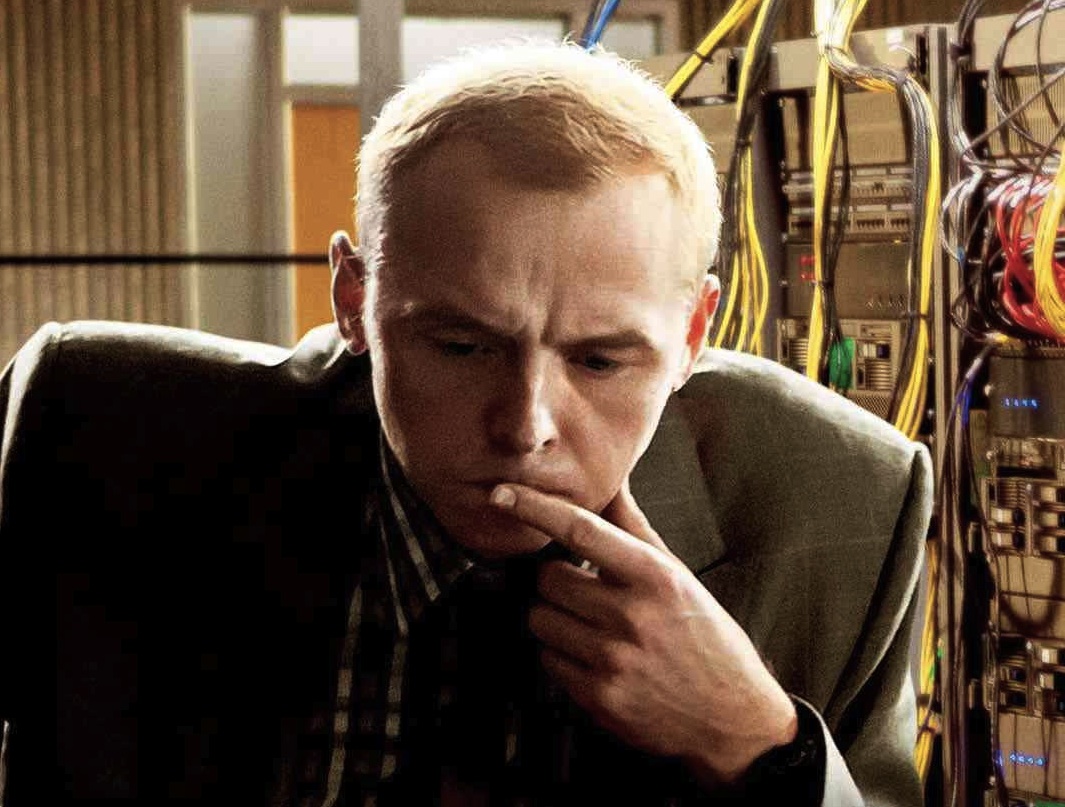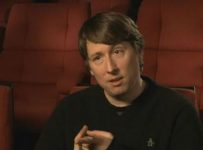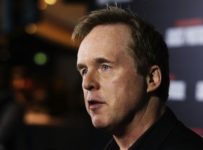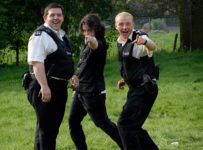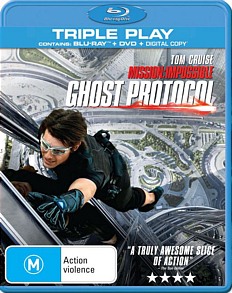 Mission: Impossible – Ghost Protocol is now available on DVD, Blu-ray and digital in Australia, and Paramount has sent over a Q & A with Simon Pegg on the making of the film and some of the other projects he had on the boil at the time.
Mission: Impossible – Ghost Protocol is now available on DVD, Blu-ray and digital in Australia, and Paramount has sent over a Q & A with Simon Pegg on the making of the film and some of the other projects he had on the boil at the time.
The interview took place last year before the film was released to audiences, so some of the information is best viewed with 2011 glasses. There’s also some good stuff in there on A Fantastic Fear of Everything, as well as covering some of the same ground as our interview with Pegg. It’s a solid read, and worth going through.
Mission: Impossible – Ghost Protocol is now available on DVD and Blu-ray wherever discs are sold from Paramount.
Q: Tell me about the story…
A: I think there’s a reason why it’s called Ghost Protocol and not Mission: Impossible IV because it felt to me almost like the beginning of a new chapter in the story of Ethan Hunt. When we first met him it was like his formative years, he was a young agent and he went through three very trying experiences and at the end of the last one appeared to be settling down and becoming a family man. Whereas we join him in this one and everything has changed – he’s a kind of elder statesman of the organisation, a senior agent and he finds himself out in the field in a situation where he’s not been before where he’s teamed up with people that he wouldn’t necessarily choose himself. The IMF code of practice is that you have a team leader who selects the agents for the mission in accordance with their skills so you can’t fail. Whereas Ethan finds himself not only in the probably most threatening situation yet but with three people he doesn’t even know and doesn’t necessarily like. So that sets up what the meat of the film is, which is essentially a kind of almost like a family drama. It’s about a dysfunctional family trying to get on with each other and work together. And I think for me, watching the film, that tends to overshadow the bigger threat in the film, which is global annihilation. The first thing that they have to do is try and solve the problems that they have with each other before they can solve the problems of the world. And I love that because it brings it down to a much more personal story. So it’s very tense and exciting and full of the most spectacular set pieces that Brad Bird is uniquely gifted in bringing to the screen but at the heart of it you have this story about a family.
Q: So Ethan and the team are on the run?
A: There is a force out there looking to cause tension in the world between United States and Russia and they hang the bombing of the Kremlin on the IMF and in particular on to Ethan and his team. They are disavowed and so there are four rogue agents who have no choice but to try and resolve the situation or die. They are cut off and they have no connection to the main server, they only have a certain amount of equipment that’s been left to them, they are completely isolated from the organisation so as such they are simultaneously on the run and trying to save the world so it’s a very high stakes adventure.
Q: Brad’s background is in animation so were you surprised to see him at the helm of a film like this?
A: It made absolute sense as soon as I heard it. The genius thing was in deciding that it was Brad who made the film. He has a talent for storytelling and staging and when I watched The Incredibles, Ratatouille and The Iron Giant, which I think is really underrated and a fantastic film, you can see that he has a gift for just knowing how the camera, or what stands for the camera in animation, can tell a story. And it isn’t a huge leap from staging that kind of stuff in a computer environment to actually doing it for real with a camera because it takes the same level of spatial awareness and intelligence and dramatic story-telling ability. Whoever thought ‘why don’t we get Brad to direct?’ was spot on.
Q: Who made that decision?
A: I think that that was probably a combination of Tom and J.J. Abrams thinking about who could do this film and they had maybe heard a whisper that Brad was looking to move into live action and they made the call. And I think that was a very wise decision. The series had reached a conclusion to some degree and one thing about this series of films is that it has always had a very eclectic group of directors attached to it. No other franchise – with perhaps the exception of the Alien films – has ever had such individual styles. You’ve had (Brian) De Palma and John Woo and then J.J. and for it to start again required an equally fresh choice of director and Brad was the perfect guy for it. In a way, I think he was the only guy and now we’ve done it and it just makes complete sense.
Q: Where did filming take you?
A: We filmed all over the world. I was on the movie for seven months. I was there on the first day of principal photography and I think I was there on the last day and we shot in Prague and then we went to Dubai and we settled eventually in Vancouver. And that’s not including second unit, which shot in India and various other places as well. So it was a truly global film and that was represented in the cast. We have a truly international cast – we have Michael Nyqvist from Sweden, there’s Lea Seydoux from France, we have people from Russia, Anil Kapoor from India, myself from the UK, Paula, Jeremy and Tom and the rest from the US, so it really is a global cast, which is fitting because it’s a global story.
Q: What happens when you make a seven-month long commitment to a film like this? Can you work on other projects at the same time?
A: I had a lot going on but basically when you commit to the film you just have to try and make your schedule work. I had a book coming out, Paul came out, Burke and Hare came out and I had to do press for all those things and that was all factored in. So I went to Prague, came back, did a book tour, went to Dubai, came back and did press for Burke and Hare, went back again, so it all just slotted in. But it was a long commitment.
Q: What was it like to spend that amount of time with one character?
A: Actually, you know, it was great fun. Usually with film it’s a very fleeing art form for an actor because you inhabit these characters very briefly, you sort of walk in and out of them whereas with theatre or a TV series you get to be them for a long time. So it was nice to spend over six months being this one particular guy.
Q: What’s Benji up to this time? It looks like he is much more involved in the action..
A: I think the film also represents a new chapter in Benji’s life. When we last saw him he was a lab guy, he was in the IT department of IMF figuring out what was on hard drives and ending up helping Ethan navigate through Shanghai by being a sort of human GPS. And when J.J. said ‘what if Benji took the field exam and became an agent?’ I was like ‘absolutely!’ (laughs). We thought of this back-story where after the Shanghai incident when he had this adrenaline fuelled day helping Ethan save the world he kind of thought ‘I can’t stay in this lab anymore, I’ve got to do something more..’ and so in the four years that have elapsed since Mission: Impossible III Benji has put forward an application to the IMF academy and he has trained and gone through the rigorous preparation of becoming an agent and he is now in the field. And when we join him he is on maybe his second or third mission, so he is very green and still new to it. He is very capable and he has all the skills required and he has passed the exams but he still has that puppyish enthusiasm of the new guy whereas Ethan is a wise old hand and is like ‘why are you here?’ And as much as he likes Benji he doesn’t actually want to spend a huge amount of time with him and Benji is like ‘I’m working with Ethan Hunt!’
Q: And that’s a nice dynamic to play.
A: (laughs). Yes, it’s similar to my relationship with Tom. I always play on the idea, which Tom really laughs about, that working with him is like Ethan working with Benji. I always used to say ‘are you going to run today? Are you going to do a sprint today?’ (laughs).
Q: It’s one of his trademarks…
A: Yes, it is. And we always used to joke about it and I’d say ‘am I going to be here when I do one of your runs?’ (laughs).
Q: In recent years the action genre has produced some great movies. Does that raise the bar?
A: Absolutely. I don’t want to criticise CGI and say ‘oh it’s not like the old days..’ It’s a medium that offers so much but you can over use it and I think sometimes with CG it can eliminate the physical presence of cinema. You can pretty much do anything these days but what I think Tom was at pains to do with this one was make sure the physical aspects of the film were there.
Q: And that ethos leads to Tom doing some incredible stunts. Were you there the day he was filming on the skyscraper in Dubai?
A: Yes, he did hang off the Burj Khalifa. I was there and we were higher up than a helicopter would fly, it was scarily high and we were only about three quarters of the way up and Tom spent like two days running around on the outside of that building. I don’t have any problem with heights but I was like ‘I cannot look..’ It made your stomach drop way. And in a way, I’m happy that pictures got out there. I’m glad that people found out that it was happening because yes, people now know that that sequence is in the film but they also know that Tom did it.
And when they watch it they will have that knowledge that Tom is up there, that’s not a studio that really is the Burj Khalifa and he’s up there on top of it. And I think it’s important for Tom to evolve the action film. His attitude is, if you are going to do an action film then make it a good one and don’t just rely on the computer.
And Brad was keen to work with live action and he didn’t want to rely on animation which is obviously his speciality – he wanted to see how far he could push the envelope in the real world and I think that’s what he did. There are some amazing sequences in the film, there are some brilliant fights and there are some set pieces that are so beautifully choreographed but look still kind of scrappy and disorganised. Because things go wrong all of the time – the equipment doesn’t work, the plan changes and things never go smoothly, it’s a scrabble, it’s a scrabble to save the world and I think that’s what gives the film this amazing tension that doesn’t let up. It’s exhausting (laughs). I was watching the film and thinking ‘I’m glad I know what happens because otherwise I’d need to take a break…’
Q: What’s the atmosphere on set like when Tom is doing a highly dangerous stunt like that?
A: Everything got very serious and you could feel it – not that it ever wasn’t serious. We had an amazing stunt team and they were great fun to work with and really accomplished, imaginative guys. But that day nobody was messing around for a second. There were people sat on the floor holding a rope the whole day, just bracing the safety cables and stuff. You have the biggest movie star in the world and he’s hanging off an incredibly high building and the whole film hinged on his safety, just from a financial stand point not even a human standpoint, although that’s obviously far more important. I remember the atmosphere on that day was deadly quiet and everyone was on their A game. No one wanted to be the one that let the rope slip, obviously, and for that reason it was done brilliantly and there were no setbacks and no slip-ups.
Q: And did you get involved in some of the action yourself and if so, did you have to train?
A: It was great because I actually trained for the film, as Benji would have for the job. I did a wide range of training for fighting and for handling weapons. It was great, really good fun. I trained with a SWAT captain from LA. The process of handling weaponry is so glossed over. What you learn is that it’s very easy to shoot off your fingers if you’re not careful and you have to draw a gun in a very specific way so that you don’t kill other people, kill yourself or blow your toes or fingers off. You learn about everything that can happen in the field and this guy is a very experienced SWAT captain. He was fantastic and a brilliant teacher. And one of the first things he said to me was ‘you know one of the things you need to know about me is that I hate guns. I’m not a fan of them at all. Some guys in the unit love them but I think they’re awful things and I try not to use them as much as I can..’ Which is a really interesting thing to hear from a guy that you would expect to be very gung ho. So he taught me that there are ways to use your gun, where your trigger finger is, where you place your feet when you’re firing. And you have to learn all of this stuff so that in the film it looks like you know what you are doing. And I learnt Chinese stick fighting and I now have this skill set that I never had before. And I didn’t know whether I was going to use it in the film or not but I had to look like I could do it. It was great and a chance to learn new things and get in shape and you know it’s a skill that I now have that I’ll be able to take forward into Star Trek and other films. It was educational and brilliant fun.
Q: Had you ever done anything like that before?
A: I’d done some training for Hot Fuzz, because we handled a lot of weapons in that film. But obviously the British police force is a little different. And Hot Fuzz was a different scenario because it was a world where weapons aren’t that common whereas in this they are a part of every day life and you had to make sure that even if you were just picking a weapon up you had to look like you knew what you were doing. There were things like you can’t blink when you fire, you squeeze the trigger but you don’t pull the trigger, all of this kind of stuff, and anyone watching who has handled a gun will go ‘oh yeah, he’s doing it right..’
Q: You’ve done some very big films, including Star Trek and Mission: Impossible III and now Ghost Protocol. Are they very different than, say, doing something like Shaun of the Dead? Does the scale of them change the nature of your job or is it essentially the same?
A: I find that when you are in the thick of it the difference isn’t huge. Every now and then it dawns on you – you’ll suddenly notice all the paraphernalia of a big set, and you think ‘wow, this is massive..’ But the difference between shooting say Shaun of the Dead and Ghost Protocol is only really about scale and the amount of catering (laughs).
Q: You’ve worked with Tom Cruise before. What was it like this time?
A: There’s a reason that Tom is where he is. It’s no accident that he’s the last of the great movie actors. He has committed his entire life to this and he does so with such intensity and his commitment is awe-inspiring. You kind of want to match it when you are with him, you kind of think ‘OK, if you’re going to give it that much then so am I and if I don’t I’ll fall behind..’ I worked for two days on the first one. I did both of my scenes on one day and went back for some stuff that was at the end and I was on Ghost Protocol for seven months so I spent a lot more time with him and we became friends on this one and it was really interesting to get an insight into the man because he is surrounded by a cloud of mythology which all seems to be generated by unclear sources and you actually meet the person and he is extremely generous and very friendly. I think he’s almost faintly apologetic for his status, it’s like ‘I’m going to go up and speak to you because I don’t want you to think that I think that I’m better than you guys..’ I remember my agent came on set and he went over and chatted to her for five minutes and she was like ‘wow, he’s lovely..’ And he is. He’s great fun and he’s doesn’t take himself entirely seriously. We had good fun together and we laughed a lot on set and all four of us, actually, became like a sillier version of the family that we played in the movie. It was very nice to meet the man and get past all of that stuff that surrounds him. He makes me giddy, you go on set and it’s exciting because there’s ‘Tom Cruise’ but also he’s a good dude. And he is also very generous and exemplary as a professional because he is a producer on the movie and he wears that hat at the same time as learning his lines. He’ll notice things like ‘oh that light’s not quite right’ or ‘that person’s costume isn’t quite right..’ at the same time as being 100 per cent involved in portraying Ethan. It’s quite amazing to watch.
Q: How involved was J.J. Abrams in the project?
A: He was totally involved but was off directing Super 8 so as a producer on Ghost Protocol he was a bit more long distance this time. But Bryan Burk was on set the whole time. J.J. was a presence but obviously he was working on his own thing but he handed it over to Brad. We did some pick-ups and J.J. managed to get there for that. But it felt very much like J.J. was in there. There’s a new energy, I think, that J.J. brings to what he does, he’s kind of reinvigorated his corner of the industry and there’s a lack of cynicism and a commitment to making good films. Hollywood has been slightly invaded by its own calling, really, by marketing people who are trying to figure out what people want to buy rather than the art of cinema and making good films. And I think a lot of the time we’re offered light shows and firework displays which just dwindle in the mind as soon as you’ve seen them but Inception proved that you can have a big scale movie with a bit of a brain. And I think the joy of this movie, Ghost Protocol, is that it has a heart and mind. It’s a smart story and it has a lovely kind of old school feel because it harks back to some older threats, you know, some old wounds that are re-opened, but it’s incredibly modern in its use of technology and its take on action – it’s a smart film that will absolutely blow your head off as well (laughs).
Q: Do you still have moments when you’re on a big film like this when you want to pinch yourself?
A: (laughs). Absolutely I do and I think it would be weird if I didn’t. My book was kind of about that sensation of often finding myself in a situation where I could tell my younger self that I was here. I found a stand up routine the other day that I’d done in 1989, a friend had recorded on his video camera, and I was talking about Spielberg and making jokes about Close Encounters and Sigourney Weaver and all these people that I’ve now worked with and become friends with. And the thrill of being on a film like Ghost Protocol is never lost to me. And even now when I consider Tom a friend, a guy that I can actually relax with, if he emails me or something I’m still really excited. I’ll show Maureen, my wife, and I’ll go like ‘look, it’s an email from Tom Cruise!’ And he’s just going ‘hi man, how are you doing?’ It’s cold where I am, how it is back there?’ It’s just very normal as you would expect from a friend but there’s still that excitement and I try not to suppress that. Working with Steven Spielberg, a guy who has inspired me my whole life, you come to set and you do your job and you don’t get silly but there is still room to jump up and down in the corridor when you’ve finished your day’s work, which Nick and I would always do (laughs).
Q: Are you pleased with Tintin?
A: Yeah, it’s great. I think children particularly will be utterly enthralled by it.
Q: Have you finished A Fantastic Fear of Everything?
A: Yes, that’s in post now and I’m very excited about the film because it was the biggest acting challenge I’ve had so far. It’s a really interesting screenplay based on a Bruce Robinson short story and Withnail and I is one of my favourite films so it has his voice. It’s adapted by Crispian Mills, son of Hayley and grandson of John, son of Roy Boulting so he really has film in his blood. And it’s a great low budget British film made at Pinewood and Shepperton and it’s very interesting. It’s kind of like a heightened horror comedy although I would probably prefer to call it a psycho-comedy, as opposed to a psycho drama, but it’s more serious than anything I’ve done before. The character of Jack is a very intense, paranoid writer who is going slowly insane. It’s funny in the same way that Withnail and I is.
Q: And when will you be starting on the new Star Trek?
A: We’ll be hitting that in January and I now know some stuff about that but I’m afraid I can’t tell you about that just yet – sorry (laughs). And Edgar and myself have just finished the first draft of our new film so we’ll hit that as soon as we finish Star Trek I hope.

